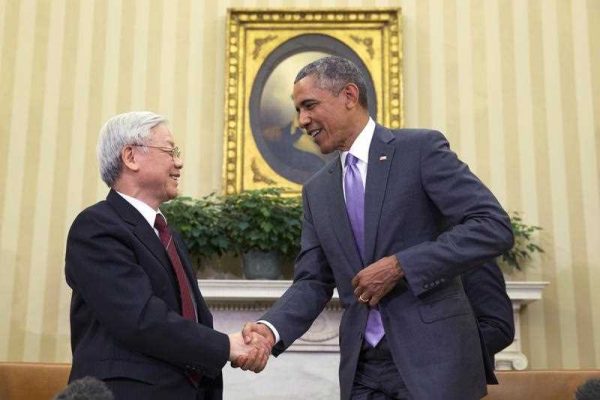The meeting between Obama and Trong was timed to coincide with the 20th anniversary of bilateral relations between these former battlefield enemies. The visit also took place during the 40th anniversary of the capture of US–backed South Vietnam by communist forces and celebrated just how far the two countries have come in reconciling their differences.
Economic relations have blossomed since normalisation, with two-way trade topping US$36 billion last year, up 12-fold since 2001 when the two countries signed a bilateral free trade agreement. Today both countries are part of the negotiations for the 12-country Trans-Pacific Partnership (TPP) trade agreement in which, once completed, Vietnam is projected to be the biggest winner. The country now exports more to the United States than any other country in Southeast Asia.
Political and security ties between Vietnam and the United States have come a long way since the two countries normalised relations. Since then, they have stepped up high-level visits and launched regular political, security, and defence dialogues to tackle outstanding issues. During a visit to Washington in July 2013, Vietnam’s president and his US counterpart laid the groundwork for a comprehensive partnership between the two countries. They agreed on nine areas of cooperation including political and economic relations, security ties, human rights, and cooperation on tackling environmental issues.
Human rights problems in Vietnam are among the most difficult between the two capitals and have the potential derail the increasingly warm ties. Freedom of expression and religion have improved markedly over the past two decades, but the Vietnamese government does not tolerate actions that it believes challenges the political supremacy of the Communist Party of Vietnam and regularly detains bloggers and dissidents who challenge the party’s position. The US State Department believes about 110 are being held at this time.
Over the past decade, the two countries have taken tentative steps to deepen military relations. They hold annual defence talks that explore issues such as search and rescue, peacekeeping, demining, military medicine, and environmental security. In October 2014, Washington partially lifted its ban on arms sales to Hanoi, which had been maintained since the end of the war due to human rights concerns. This move allows Vietnam to purchase equipment such as radar and Coast Guard vessels for maritime domain awareness.
Part of this warming of military ties has no doubt been driven by tensions in the South China Sea as China, Vietnam’s nominal communist ally, has stepped up its aggressiveness since 2009 in pressing its nine-dash line claim over much of the strategically-important sea. China has from time to time cut the seismic cable of Vietnamese oil exploration vessels and arrested Vietnamese fishermen around disputed islands. Tensions escalated in May 2014 when China moved a deep-water oilrig into an area Hanoi considers to be part of its exclusive economic zone.
Despite the tensions with China, Vietnam has moved gingerly in expanding its naval cooperation and military ties with the United States, even though the US military would be ready to deepen cooperation much more quickly. Part of this seems to be due to concerns among Vietnamese leaders about prompting countermoves from China, with which Hanoi shares a land border and several millennia of history.
People-to-people ties between Vietnam and the United States have been at the forefront of efforts to boost bilateral relations. The 16,500 Vietnamese students studying in US universities in 2015 make them the largest grouping of Southeast Asians studying in the United States. Washington has begun to clean up some of the sites polluted with dioxin, the contaminant in Agent Orange that the US military used in Vietnam and is linked to cancer and birth defects.
Completing the TPP trade agreement was one of the top agenda items when party chief Trong met Obama in Washington. Vietnam is looking for more access to the US market, particularly for Vietnamese garment exports, while the United States is looking for guarantees from Hanoi that it will grant workers freedom of association outside of the Communist Party umbrella.
The Vietnamese leader witnessed the signing of a raft of business deals, including the sale of Boeing airplanes to Vietnam. He also observed the signing of an agreement granting a license for the establishment of an independent Fulbright University in Vietnam that will be allowed to use its own curriculum. US and Vietnamese officials signed other agreements during the visit ranging from the avoidance of double taxation to cooperation in international peacekeeping and boosting Vietnam’s civil aviation safety.
The geopolitics of the South China Sea have driven these two erstwhile foes closer together in recent years. Hanoi would like the Washington to totally lift its ban on lethal weapons sales and for Obama to visit Vietnam when he travels to Asia in November. Whether either happens will depend at least in part on the two countries’ ability to resolve their differences and complete the TPP trade pact in the weeks ahead and Washington’s perception that Hanoi is granting its citizens increased freedoms even as it prepares to hold a party congress early next year.
Murray Hiebert is a senior fellow in the Sumitro Chair for Southeast Asian Studies at the Center for Strategic and International Studies (CSIS) in Washington, DC.

